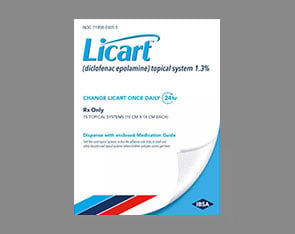
Licart Coupons & Savings Card – Discount Prices from $53.87
My prescription
Edit
1.3%, Licart (2 Patch 24 Hours)
Select pharmacy

CVS
$87.07
COUPON PRICE
Walmart
$53.87
COUPON PRICE
Walgreens
$55.60
COUPON PRICE
Albertsons
$57.88
COUPON PRICELicart savings card
Show this card to your pharmacist
Walmart
$53.87
BIN
ID
PCN
GRP
019876
LH85BCBB61
CHIPPO
LHX
Powered by
Related NSAIDs prescriptions
More prescriptions for pain
Related NSAIDs prescriptions
More prescriptions for pain
Price history for Licart
2 Patch 24 Hours, 1.3%
Average retail price for Licart
Average SaveHealth price for Licart
Our price history data is based on aggregated prescription data collected from participating pharmacies in America. Our prescription data updates daily to reflect the latest price changes. If you notice a missing data point, it means there wasn't sufficient data available to generate a monetary value for that date.
*Retail prices are based on pharmacy claims data, and may not be accurate when we don't have enough claims.
Licart dosage forms
Dosage Quantity Price from Per unit 1.3% 2 Patch 24 Hours $53.87 $26.93 1.3% 1 Patch 24 Hour $26.93 $26.93 1.3% 3 Patch 24 Hours $80.80 $26.93 1.3% 4 Patch 24 Hours $107.73 $26.93 1.3% 6 Patch 24 Hours $161.60 $26.93
| Dosage | Quantity | Price from | Per unit |
|---|---|---|---|
| 1.3% | 2 Patch 24 Hours | $53.87 | $26.93 |
| 1.3% | 1 Patch 24 Hour | $26.93 | $26.93 |
| 1.3% | 3 Patch 24 Hours | $80.80 | $26.93 |
| 1.3% | 4 Patch 24 Hours | $107.73 | $26.93 |
| 1.3% | 6 Patch 24 Hours | $161.60 | $26.93 |
What is Licart used for?
Licart is a topical medication used for the relief of pain associated with minor strains, sprains, and contusions. It contains diclofenac epolamine, a nonsteroidal anti-inflammatory drug (NSAID), which helps reduce inflammation and pain in the affected area.
How much does the Licart patch cost?
The cost of the Licart patch can vary depending on factors such as the pharmacy, location, and whether the patient has insurance coverage. Without insurance, the price can range from approximately $300 to $400 for a box of 30 patches. Patients are advised to check with their local pharmacy for the most accurate pricing and to inquire about any available discounts or patient assistance programs.
Is Licart an opioid?
Licart is not an opioid. It is a topical medication containing diclofenac, which is a nonsteroidal anti-inflammatory drug (NSAID) used to relieve pain.
Is Licart covered by Medicare?
Licart, a topical medication, may be covered by Medicare Part D or Medicare Advantage plans that include prescription drug coverage. However, coverage can vary depending on the specific plan. It is advisable for individuals to check directly with their Medicare plan provider to confirm if Licart is included in their formulary and to understand any associated costs or restrictions.
Do licart patches work?
Licart patches, which contain the active ingredient diclofenac epolamine, are used for the topical treatment of acute pain due to minor strains, sprains, and contusions. They are designed to deliver the medication directly to the site of pain, potentially providing relief. The effectiveness of Licart patches can vary from person to person, but they are generally considered effective for their intended use. It is important for individuals to follow the prescribed instructions and consult with a healthcare provider if they have any concerns or if the pain persists.
